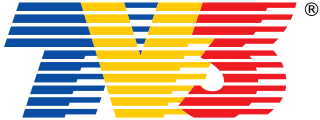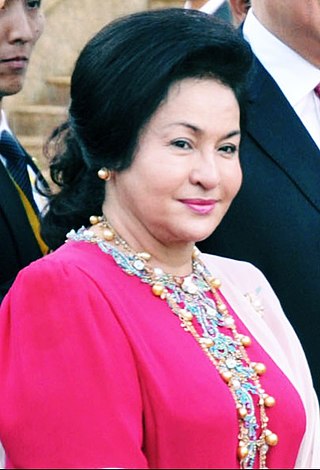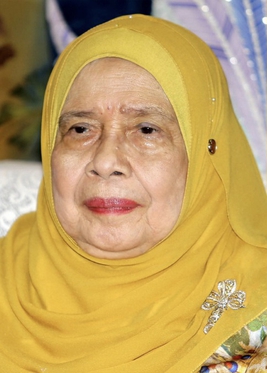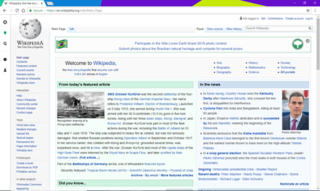Related Research Articles
Islamic dietary laws are laws that Muslims follow in their diet. Islamic jurisprudence specifies which foods are halāl and which are harām. The dietary laws are found in the Quran, the holy book of Islam, as well as in collections of traditions attributed to Islamic prophet Muhammad ("Sunnah").

Halal is an Arabic word that translates to 'permissible' in English. In the Quran, the term halal is contrasted with the term haram. This binary opposition was elaborated into a more complex classification known as "the five decisions": mandatory, recommended, neutral, reprehensible and forbidden. Islamic jurists disagree on whether the term halal covers the first two or the first four of these categories. In recent times, Islamic movements seeking to mobilize the masses and authors writing for a popular audience have emphasized the simpler distinction of halal and haram.

Sistem Televisyen Malaysia Berhad, operating as TV3, is a Malaysian free-to-air television channel owned by Malaysian media conglomerate, Media Prima. TV3 is the third and third oldest TV station in Malaysia. It was launched on 1 June 1984 as the country's first and oldest private television channel. As of October 2021, TV3 remains to be the most-watched television station in Malaysia with about 17% of its viewing share among other Malaysian television stations, followed by TV9 with 15% of its viewing share, making two of them become the second most-watched television station in the country, despite the declining viewership of 3 free-to-air television channels.
Johor Port is a port in Pasir Gudang, Johor, Malaysia, built in 1977. It is an integrated multi-purpose port facility providing bulk cargo, container and general cargo services. It is the world's largest palm oil terminal and ranks third globally in terms of LME cargo volume.

Ramly Processing Sdn. Bhd. is a Malaysian frozen and fast food company founded by Ramly bin Mokni through Pemasaran Ramly Mokni Sdn. Bhd.

The Royal Malaysian Customs Department is a government department body under the Malaysian Ministry of Finance. RMCD functions as the country's main indirect tax collector, facilitating trade and enforcing laws. The top management of JKDM is led by the Director General of Customs and assisted by 3 deputies, namely, the Deputy Director General of Customs Enforcement/Compliance Division, the Deputy Director General of Customs Customs/Inland Tax Division and the Deputy Chief Director of Customs Management Division. The Royal Malaysian Customs Department consists of several divisions, namely the Enforcement Division, the Inland Tax Division, the Compliance Division, the Customs Division, and the Technical Services Division.

Malaysia–Saudi Arabia relations refers to the current and historical relationship between Malaysia and Saudi Arabia. Saudi Arabia has an embassy in Kuala Lumpur, while Malaysia has a High Commission in Riyadh and a consulate general in Jeddah. Relations, both diplomatic and economic, are quite close between the two Muslim-majority Organisation of Islamic Cooperation (OIC) members.

The 1993 amendments to the Constitution of Malaysia was passed by the Malaysian parliament with the aim of removing legal immunity of the royalty. The changes, which saw the amendments of Articles 32, 38, 42, 63, 72 and 181 in the Constitution of Malaysia, was implemented in March 1993. Before the amendments were made, the Constitution granted rulers who have violated the law not to be prosecuted by the criminal court unless he voluntarily wishes to surrender his legal immunity.

Rosmah binti Mansor is the second wife of former Prime Minister of Malaysia, Najib Razak. Like her husband, she was implicated in the 1Malaysia Development Berhad scandal (1MDB). On 1 September 2022, she was found guilty of corruption in relation to a school electricity project, fined $303m and sentenced to ten years imprisonment.

Tun Hajah Rahah binti Mohamed Noah was the wife of the 2nd Malaysian Prime Minister Tun Abdul Razak Hussein (1922–1976) and the mother of former Prime Minister Najib Razak. She was the daughter of Mohamed Noah Omar, 1st Speaker of the Dewan Rakyat (1897–1991).

Orang Seletar are one of the 18 Orang Asli ethnic groups in Malaysia. They are classified under the Proto-Malay people group, which forms the three major people group of the Orang Asli. The Orang Seletar are also considered as part of the Orang Laut, natives of the Straits of Johor; separating Singapore from Peninsula Malaysia.

According to a 2013 public survey in Malaysia by Transparency International, a majority of the surveyed households perceived Malaysian political parties to be highly corrupt. A quarter of the surveyed households consider the government's efforts in the fight against corruption to be ineffective. Corruption in Malaysia generally involves political connections still playing an important role in the outcome of public tenders.
Halal literally means "permissible" in Arabic and refers to food items that are permissible to consume under Sharia law, whereas haram refers to any substance not permitted to consume. According to the Australian Food and Grocery Council, halal foods must be "free from any substance taken or extracted from a haram animal or ingredient ; [be] made, processed, manufactured and/or stored by using utensils, equipment and/or machinery that has been cleaned according to Islamic law ; and [be] free from contact with, or being close to, a haram substance during preparation, manufacture, processing and storage ."
Liga Perdana was the top-tier football league in Malaysia that operated from 1994 to 1997. The league was formed and established in 1994 to succeed the Liga Semi-Pro and became the Malaysian fully professional football league. At this time the league was interchangeably referred as Malaysian League.
The Sabah State Water Department corruption probe refers to a 2015 to 2016 widespread investigation by the Malaysian Anti-Corruption Commission (MACC) over the alleged abuse of power inside the Sabah State Water Department resulting in the arrest of two senior officers in the state agency along with the confiscation of RM3 million which had been kept inside a safe deposit box in the office of one of the suspects, together with a total of RM52 million cash were seized from various more places, including from the officials' house which also includes gold and stone jewellery, luxury brand watches, 94 branded handbags, nine luxury cars and folders containing 127 land grants of the two officers. Another businessman with the title of "Datuk" and his accountant were also arrested in connection with the case. During the confiscation of the RM52 million, the MACC members of 30 people took 15 hours to go through, using the serial numbers to estimate some of the sealed stacks.
Halal meat is meat of animal slaughtered according to Quran and Sunnah and thus permitted for consumption by Muslims.
Akmal Nasrullah Mohd Nasir, better known as Akmal Nasir, is a Malaysian politician who has served as the Deputy Minister of Local Government Development in the Pakatan Harapan (PH) administration under Prime Minister Anwar Ibrahim and Minister Nga Kor Ming since December 2022 and the Member of Parliament (MP) for Johor Bahru since May 2018. He is a member of the People's Justice Party (PKR), a component party of the PH coalition. He served as the 4th Youth Chief of PKR from November 2018 to July 2022.

SalamWeb is a discontinued Chromium-based browser developed by the now-defunct Malaysian start-up Salam Web Technologies MY Sdn. Designed to deliver a Muslim-friendly Web experience, and targeted towards the Muslim audience, it observed the Islamic law and tradition and was certified as a Muslim compliant web browser.
The Halal pork scandal of South Africa was a scandal that broke out in South Africa in 2011 where a leading meat importer labelled pork as halal. The importer was also accused of relabelling kangaroo meat from Australia and water buffalo meat from India as halal even though South Africa's halal certification authority, the Muslim Judicial Council (MJC) had not approved these. The accused company, Cape Town based importer, Orion Cold Storage said it was the victim of a smear campaign by its rival businesses. The MJC suspended its dealings with Orion Cold Storage and the accusing Muslim companies obtained a court order banning Orion from using the halal label. The South African Halaal Authority Trust, the Red Meat Industry Forum of South Africa and the South African Meat Industry Company filed an interdict application against Orion, to stop the company from distributing meat.

Halal conspiracy theories revolve around a series of Islamophobic conspiracy theories and hoaxes regarding halal certification in products such as food, beverages and cosmetics. The claims usually made include that the sale of halal-certified goods in stores is a precursor to the Islamization or institution of Sharia law in a non-Muslim country, that the fees paid by companies for halal certification fund Islamic terrorism, that halal slaughter for meat is cruel, unhygienic or constitutes as animal sacrifice, among others. The spread of these claims has resulted in boycotts and harassment campaigns against businesses who sell halal-certified products, most notably in Australia and India, although anti-halal boycott movements also exist in Denmark, France, Canada, New Zealand, the United Kingdom and the United States.
References
- 1 2 "Malaysian cartel allegedly sold fake halal meat to Muslims for 40 years". South China Morning Post. 30 December 2020.
- 1 2 3 4 5 6 7 Adam, Ashman (4 January 2021). "How Malaysia's 'meat cartel' scandal unfolded: A timeline". Malaymail.
- 1 2 Raghu, Anuradha (30 December 2020). "Fake Halal Meat Scandal in Muslim-Majority Malaysia Fuels Anger". Bloomberg.
- 1 2 "Four remanded in Malaysia's fake halal meat scandal as corruption probe gets under way". Straits Times. 4 January 2021.